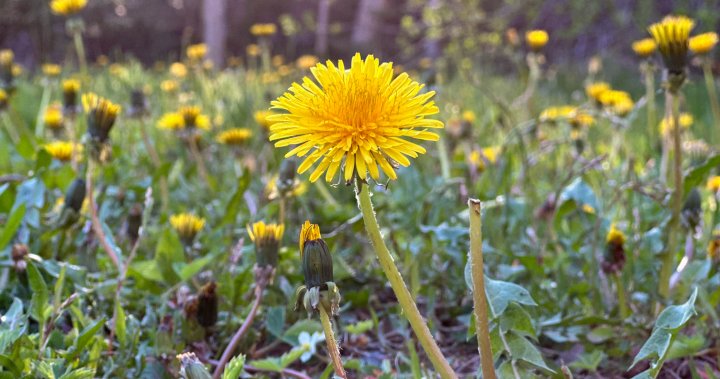“No Mow May” is a movement that encourages homeowners to refrain from mowing their lawns during the spring to support the native bee population. However, opinions are divided on the effectiveness of this method. Richelle Gregg, a master gardener in Timberlea, N.S., describes the movement as controversial, stating that untrimmed grass may not offer nutritional value for native pollinators. She emphasizes the importance of supporting native bees such as sweat bees, digger bees, and mason bees in addition to honeybees, which were brought in to support agriculture. Gregg recommends designating a portion of your yard for native flowers like bee balm, goldenrod, and black-eyed Susan to support the native bee population.
Gregg advises people to do additional research on “No Mow May” before making a decision, as letting grass grow too long and suddenly cutting it can cause stress to the grass. Truro, N.S. residents share their thoughts on the movement, with some choosing to continue mowing their lawns for aesthetic reasons and to prevent overgrowth. While some support “No Mow May,” others prefer to keep their front yards well-trimmed. The movement aims to raise awareness about the importance of a healthy bee population and the need to support all bee species, not just honeybees.
Paul Manning, an assistant professor at Dalhousie University’s Faculty of Agriculture, explains that dandelions, which commonly flower in lawns during the spring, may not provide substantial nutritional value for bees. He states that dandelions can outcompete other plants that could be more beneficial for bee species. Manning emphasizes the importance of researching the most nutritionally appropriate plants for supporting native bee populations. Bees play a crucial role in sustaining a healthy environment and supporting the food chain, with hundreds of bee species native to Canada.
Manning highlights the significance of bees in pollinating various food crops essential for human health, such as blueberries, cranberries, almonds, and apples. He emphasizes the role of bees in ensuring the reproduction and growth of plants, which is vital for maintaining a diverse ecosystem. Manning urges people to prioritize ways to support all bee populations, including native bees that play a unique role in pollination. Despite the mixed evidence regarding the effectiveness of “No Mow May,” Manning acknowledges that the movement has prompted people to think more critically about supporting native bee populations and choosing nutritionally suitable plants for bees.
Overall, while “No Mow May” aims to aid the native bee population by encouraging homeowners to refrain from mowing their lawns, opinions on its effectiveness vary. Richelle Gregg emphasizes the importance of supporting all bee species, including native bees, to maintain a healthy ecosystem. Residents in Truro, N.S. share conflicting views on the movement, with some choosing to mow their lawns for aesthetic reasons, while others participate in “No Mow May.” Paul Manning underscores the importance of prioritizing the support of native bee populations and selecting nutritionally appropriate plants to sustain bee species critical for pollination and ecosystem health.


